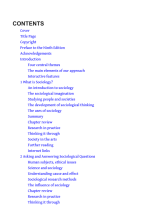Work and Employment - What is work? - Definitions and types of work
13 important questions on Work and Employment - What is work? - Definitions and types of work
What is the definition of work in a wide sense?
The execution of tasks aimed at producing goods and services that cater to human needs, involving the application of mental and/or physical effort.
What do sociologists deem to be the six most important characteristics of work?
- Money.
- Activity level.
- Variety.
- Temporal structure.
- Social contacts.
- Personal identity.
What do sociologists mean with 'Activity level' and why is it deemed as being one of the six characteristics of work?
- Higher grades + faster learning
- Never study anything twice
- 100% sure, 100% understanding
What do sociologists mean with ''variety' and why is it deemed as being one of the six characteristics of work?
What do sociologists mean with 'temporal structure' and why is it deemed as being one of the six characteristics of work?
What do sociologists mean with 'social contacts' and why is it deemed as being one of the six characteristics of work?
What do sociologists mean with 'personal identity' and why is it deemed as being one of the six characteristics of work?
How would you describe the term 'informal economy'?
- Transactions outside the sphere of regular employment.
- Could involve cash exchange, but often direct exchange of goods or services.
- Ebay.
- Doing a chore for cash.
- DIY activities, which provide goods/services that would otherwise have to be purchased.
According to Marx, the capitalist division of labour alienates human beings from their own labour, a key aspect of their sense of self.
What does Marx mean with 'alienation?'
What is the difference in vision of Durkheim and Marx on the division of labour?
- Marx: division of labour leads to alienation.
- Durkheim: Potentially harmful effects exist, but specialization of roles will strengthen social solidarity through multidirectional relationships of production and consumption.
What are the three main reasons for the shift of dominant employment sectors in industrialized countries in the 20th century from blue-collar manufacturing occupations to white-collar occupations in the service sector?
- The continual introduction of labour-saving machinery, culminating in the spread of information technology.
- The migration of their production to cheap labor countries with unregulated economic environments, by transnational corporations.
- The development of welfare states, after 1945, led to the creation of large bureaucracies in healthcare and public services, generating numerous service-sector jobs."
"In the 1960s, some sociologists were already theorizing the emergence of a post-industrial society."
What did they mean with a post-industrial society?
What do sociologists see as a large consequence of the shift from industrial work environments to work environments in specialized service sectors?
- It gave rise to a less favourable environment for:
- Workers' collective identities.
- Workers' collective action.
- Trade unionism.
The question on the page originate from the summary of the following study material:
- A unique study and practice tool
- Never study anything twice again
- Get the grades you hope for
- 100% sure, 100% understanding































